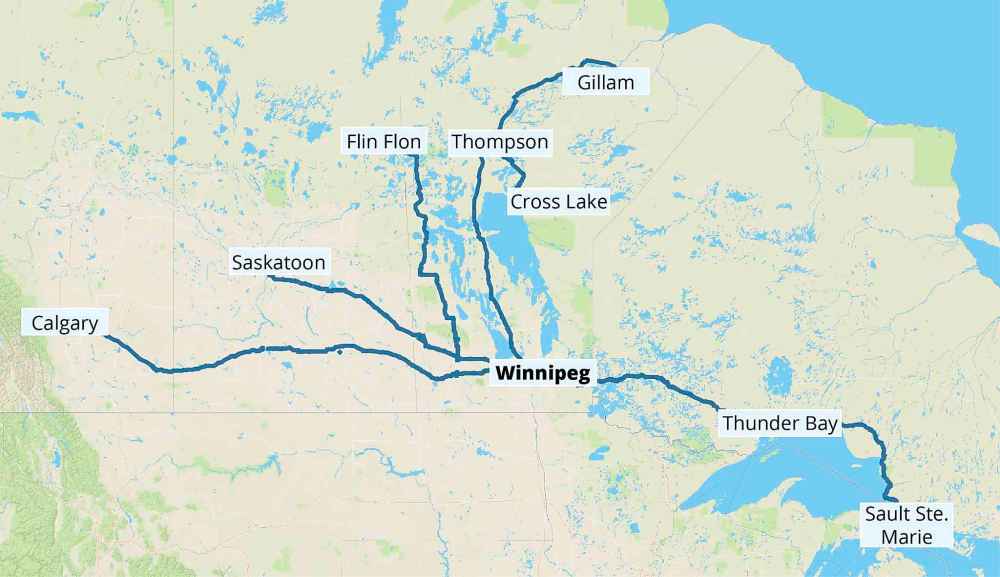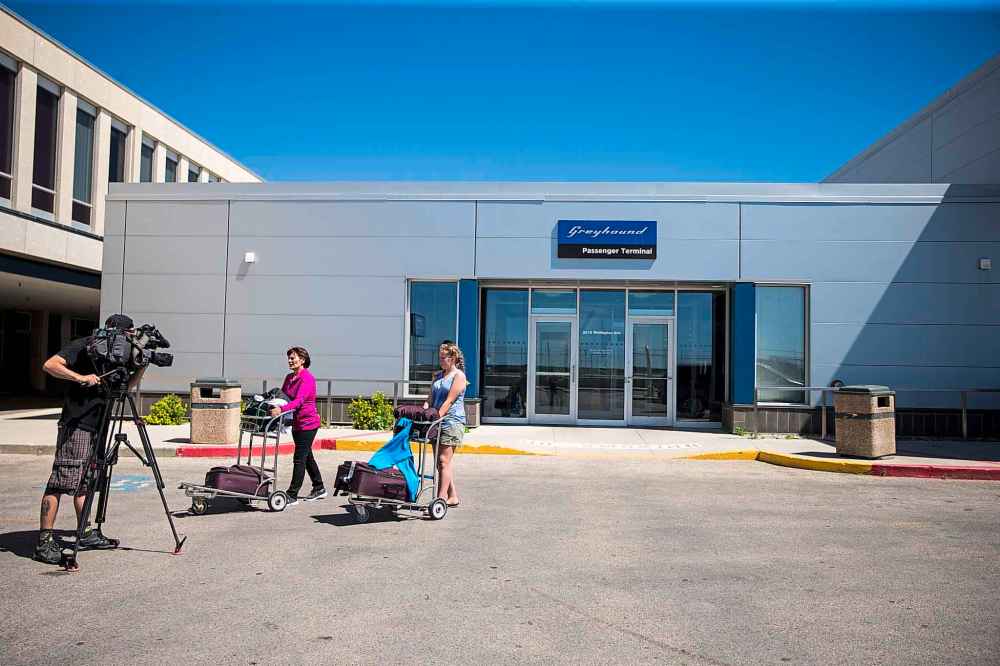Greyhound abandons the prairies Citing a drop in ridership, the bus line will discontinue nearly every route in Western Canada
Read this article for free:
or
Already have an account? Log in here »
To continue reading, please subscribe:
Monthly Digital Subscription
$0 for the first 4 weeks*
- Enjoy unlimited reading on winnipegfreepress.com
- Read the E-Edition, our digital replica newspaper
- Access News Break, our award-winning app
- Play interactive puzzles
*No charge for 4 weeks then price increases to the regular rate of $19.00 plus GST every four weeks. Offer available to new and qualified returning subscribers only. Cancel any time.
Monthly Digital Subscription
$4.75/week*
- Enjoy unlimited reading on winnipegfreepress.com
- Read the E-Edition, our digital replica newspaper
- Access News Break, our award-winning app
- Play interactive puzzles
*Billed as $19 plus GST every four weeks. Cancel any time.
To continue reading, please subscribe:
Add Free Press access to your Brandon Sun subscription for only an additional
$1 for the first 4 weeks*
*Your next subscription payment will increase by $1.00 and you will be charged $16.99 plus GST for four weeks. After four weeks, your payment will increase to $23.99 plus GST every four weeks.
Read unlimited articles for free today:
or
Already have an account? Log in here »
Hey there, time traveller!
This article was published 09/07/2018 (2715 days ago), so information in it may no longer be current.
Some rural and northern communities will have one less travel and freight option after Greyhound Canada announced Monday it’s shuttering its passenger bus service in Manitoba and western Canada this fall.
Citing a 41 per cent decline in ridership since 2010, Greyhound will stop running its passenger buses and freight service through rural and northern Manitoba on Oct. 31, where in some areas it’s the only transportation available other than private vehicles.
”This decision is regretful and we sympathize with the fact that many small towns are going to lose service,” Greyhound Canada senior vice-president Stuart Kendrick said. ”But simply put, the issue that we have seen is the routes in rural parts of Canada — specifically Western Canada — are just not sustainable anymore.”

Portage la Prairie Mayor Irvine Ferris said the service shutdown will have an immediate effect on his community, both on citizens who use it for travelling and small businesses that use Greyhound’s courier service, too.
“It’s a double whammy for smaller communities,” Ferris said.
He said he understands ridership is in decline, but he said he’d like to see some kind of service for people who don’t own cars, especially seniors who need to go to other communities for medical treatment.
Shutting down passenger buses will have a major impact on northern First Nations. Many Manitoba First Nations have few medical services — the sick are usually brought to Winnipeg by Greyhound to attend doctor appointments or for medical treatment.
Northern Canada is sure to be where the impact is felt most deeply, said Sheila North, grand chief of the Manitoba Keewatinowi Okimakanak and candidate for chief of the Assembly of First Nations.
“I think this is abandoning the North,” she said, citing a high demand in the region for transportation services — “especially for those that live in poverty, but also who have medical needs that need to get down to the south for resources that are not accessible in the North.”
“Our citizens rely heavily on Greyhound, especially from northern communities,” said Grand Chief Arlen Dumas of the Assembly of Manitoba Chiefs in a written statement. “It is already well documented that our citizens have to ride the bus for hours, some longer than 14 hours, in order to see a doctor. How will they get access to adequate health care now?”
It’s an issue for rural Manitobans with disabilities, too, one advocate said.

Opportunity knocking, but Manitoba chartered bus line suspects risks outweigh rewards
News that Greyhound will spike the majority of its Western Canada operations effective Oct. 31 – leaving Manitoba without a non-chartered bus option – may be music to the ears of local entrepreneurs interested in filling the void.
News that Greyhound will spike the majority of its Western Canada operations effective Oct. 31 – leaving Manitoba without a non-chartered bus option – may be music to the ears of local entrepreneurs interested in filling the void.
John Fehr, owner of Beaver Bus Lines Ltd., a Winnipeg-based chartered bus service, said he expects transportation companies are eyeing Greyhound Canada’s demise in the Prairies as an opportunity.
“It’s definitely something to look at. Whether or not I would consider it, I can’t say either way. If you’re going to take a chance on that, it’s a matter of doing due diligence and choosing a route that’s profitable,” Fehr said Monday.
Fehr thinks Greyhound made the most money on its northern routes, to communities such as Thompson, Flin Flon and The Pas. Those runs also served as important lifelines for the communities, giving residents without access to vehicles — or the ability to drive — a way to travel.
“From past experience, I know that the profitable runs are always the north runs, because not only do you have passengers but also freight. So someone stepping up to fill those, maybe that’s something to consider,” Fehr said.
“I’m sure there are going to be people out there interested in giving it a try. I don’t know who exactly, but I’m sure there are people out there looking at this as an opportunity.”
When it comes to other rural routes, however, Fehr wasn’t so sure. The routes may not be popular enough to be profitable.
“If you have people that ride on a regular basis, then great, but if people only want to ride it once a month, or twice a month, it’s tough to survive. Everybody wants the service when they need it, but not everybody wants to ride consistently,” Fehr said.
Manitoba Infrastructure Minister Ron Schuler said he’s confident other companies could operate a profitable service in the province, or in the Prairies as a whole. He said there’s money to be made by moving freight, and a new company might do better if it operated smaller buses. He also suggested First Nations may be interested in operating a bus service in northern Manitoba.
However, Schuler made clear that the Progressive Conservative government is not willing to get into the bus business or to subsidize any new bus service. He noted the previous NDP government provided nearly $8 million in subsidies to Greyhound.
In May 2017, the Saskatchewan Transportation Company (STC), a provincial Crown corporation, ceased operations, citing a sharp decrease in ridership, and claiming only two of its routes turned a profit. That left Saskatchewan in a situation similar to the one Manitoba will soon find itself in, with a lack of non-chartered bus options.
In the wake of the STC’s demise, a number of chartered bus companies expanded services, while other new companies popped up in an effort to capitalize on the market void.
One of the business owners who tried to take advantage of the STC shutdown was Diane Smith, owner of DiCal Transport. Her company positioned itself to pick up a couple former STC routes, but admits the experience so far has been bumpy, at best.
“To be 100 per cent honest, it’s been very frustrating. Every way we try to go, we’ve been running into brick walls. When the STC shut down, I think there were 12 (companies) that applied (to the highway traffic board). Only two are still in service,” Smith said.
Beginning July 31, Smith’s company will be cutting back to one route running from Melville to Regina. In Saskatchewan, she said rural routes aren’t popular enough to cover the cost of operations, let alone turn a profit.
“It’s not financially sustainable. You need to be full every time you travel, in each direction, and that’s not possible,” she said.
Nonetheless, Smith made clear she doesn’t regret her decision to expand her business, and would encourage Manitoba-based business owners to take a similar, but carefully calculated, risk.
“I think you need to try things and take risks in order to expand. I think any entrepreneur that wants to grow their business, or to establish one, will step up and give it a try (in Manitoba),” she said. “Who knows? Maybe Manitoba will have more of a need than Saskatchewan.”
— With files from Larry Kusch
ryan.thorpe@freepress.mb.ca
Twitter: @rk_thorpe
“The bus allowed people with disabilities a chance to connect with people and access services,” Winnipeg disability advocate Carlos Sosa said Monday. “For people with disabilities, a good proportion don’t have the money to buy a car,” he said. “When you don’t have money to buy a car and you need to get to a major centre for a medical appointment or health services or schooling, what other options are there?”
“My hope is for the federal and provincial governments to work together and come up with a transportation strategy,” said Sosa. “It’s extremely critical for people with disabilities” who live outside Winnipeg.
Phil Graham, a blind man from Kenton, Man., regularly rides the bus from Brandon to Winnipeg or to northwest Ontario to visit family. He remembers Greyhound’s service being enjoyable and affordable when he started riding after going blind in 1977. However, that’s changed — he said even with the service available now, it’s quite difficult for him to get around.
“It’s going to be difficult and more expensive,” Graham said Monday about the service cuts.
Seventy-year-old Frank Bruce usually takes the train from Winnipeg to his home in Armstrong, Ont., which is about 250 km north of Thunder Bay. However, he had a medical appointment in Thunder Bay Tuesday, so he needed to take the bus. He said he thinks Greyhound’s service is subpar compared to train service and that the company would have more customers if its rates were cheaper.
“I’m just glad it’s still running today,” Bruce said Monday in front of the Winnipeg Greyhound bus depot.

Not only will rural areas lose service — 415 Greyhound employees across the prairies will lose their jobs when the service ends this fall, Kendrick told the Canadian Press.
“It’s never good news,” said one Greyhound employee, who declined to give his name, when he saw reporters outside the Winnipeg bus depot.
Meanwhile, the impending Greyhound service shutdown caught the province by surprise.
Infrastructure Minister Ron Schuler said, “We were not consulted. Neither did we get any advance notice.”
“We’re perturbed at the fact that they’re looking at the end of October in pulling out. That’s not a lot of time for individuals to put a business case together to look for financing,” he told reporters.
Barry Prentice, a University of Manitoba supply chain management professor and transportation expert told the Free Press the issue of providing transportation in rural areas won’t be an easy one for government to fix.
“This is a symptom of a larger problem across the country,” Prentice said. “We have low-density areas in terms of traffic and the buses just aren’t able to compete with private automobiles.”

“But there is always that group of people too old to drive, too poor to drive or too young to drive and they’re left with the bus,” said Prentice.
In the past, Greyhound had a monopoly on passenger service on the Trans Canada Highway, Prentice explained. With the profit from that monopoly, Greyhound could subsidize its rural routes. However, as ridership declined, those profits have since dried up.
— with files from Larry Kusch, Carol Sanders and the Canadian Press
erik.pindera@freepress.mb.ca

Erik Pindera reports for the city desk, with a particular focus on crime and justice.
Our newsroom depends on a growing audience of readers to power our journalism. If you are not a paid reader, please consider becoming a subscriber.
Our newsroom depends on its audience of readers to power our journalism. Thank you for your support.









